Learning to Rea1
- 格式:doc
- 大小:45.00 KB
- 文档页数:3
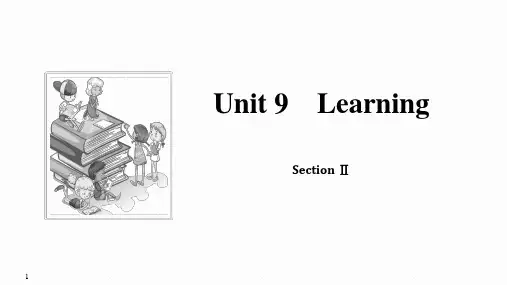
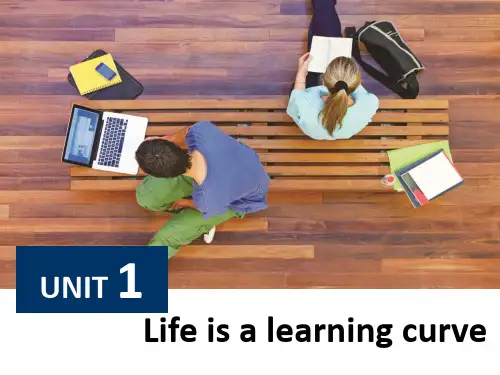
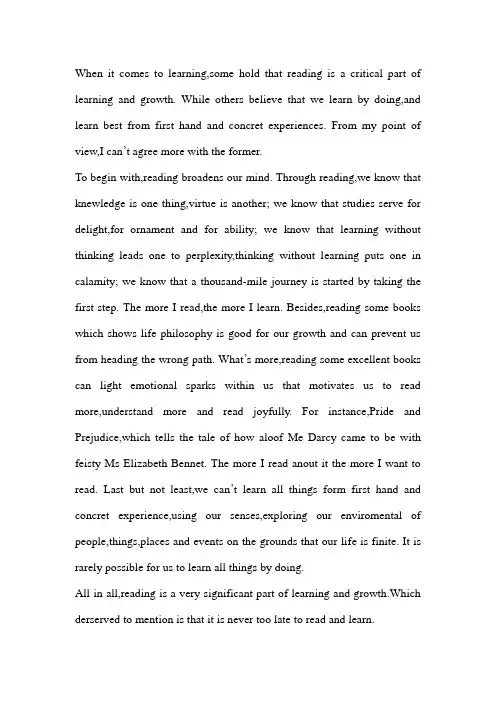
When it comes to learning,some hold that reading is a critical part of learning and growth. While others believe that we learn by doing,and learn best from first hand and concret experiences. From my point of view,I can’t agree more with the former.To begin with,reading broadens our mind. Through reading,we know that knewledge is one thing,virtue is another; we know that studies serve for delight,for ornament and for ability; we know that learning without thinking leads one to perplexity,thinking without learning puts one in calamity; we know that a thousand-mile journey is started by taking the first step. The more I read,the more I learn. Besides,reading some books which shows life philosophy is good for our growth and can prevent us from heading the wrong path. What’s more,reading some excellent books can light emotional sparks within us that motivates us to read more,understand more and read joyfully. For instance,Pride and Prejudice,which tells the tale of how aloof Me Darcy came to be with feisty Ms Elizabeth Bennet. The more I read anout it the more I want to read. Last but not least,we can’t learn all things form first hand and concret experience,using our senses,exploring our enviromental of people,things,places and events on the grounds that our life is finite. It is rarely possible for us to learn all things by doing.All in all,reading is a very significant part of learning and growth.Which derserved to mention is that it is never too late to read and learn.。
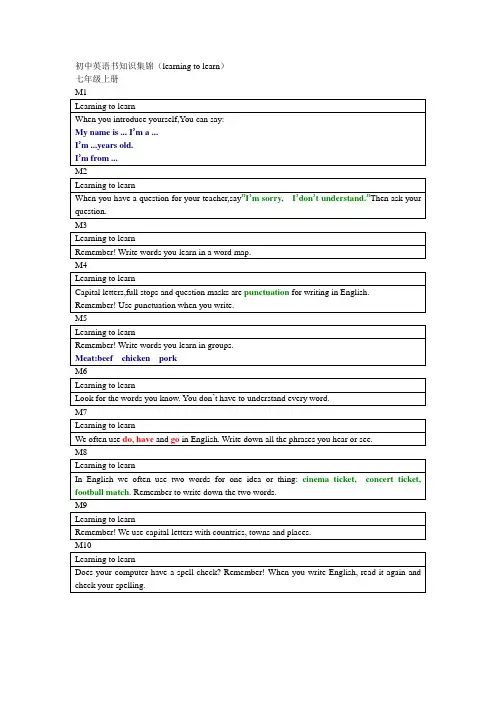
初中英语书知识集锦(learning to learn)七年级上册M1Learning to learnWhen you introduce yourself,You can say:My name is ... I’m a ...I’m ...years old.I’m from ...M2Learning to learnWhen you have a question for your teacher,say”I’m sorry, I’don’t understand.”Then ask your question.M3Learning to learnRemember! Write words you learn in a word map.M4Learning to learnCapital letters,full stops and question masks are punctuation for writing in English. Remember! Use punctuation when you write.M5Learning to learnRemember! Write words you learn in groups.Meat:beef chicken porkM6Learning to learnLook for the words you know. You don’t have to understand every word.M7Learning to learnWe often use do, have and go in English. Write down all the phrases you hear or see.M8Learning to learnIn English we often use two words for one idea or thing: cinema ticket, concert ticket, football match. Remember to write down the two words.M9Learning to learnRemember! We use capital letters with countries, towns and places.M10Learning to learnDoes your computer have a spell check? Remember! When you write English, read it again and check your spelling.七年级下册M1Learning to learnRemember:we always say take photos! In English we always use some words before or after other words, such as the phrases wait for, do my homework, put on my sweater...Learning to learnLots of words and phrases? Choose six or seven words and phrases which are important to you. Write them down.M2Learning to learnWhen you write mew words, wrote them under headings, in groups or in a word map. Use pictures and drawings.M3Learning to learnIn English, some words are nouns and verbs. For example, cook and test in this module are nouns, but they can be verbs, too. Pay attention to their different meanings. Can you find more words like these two?M4Learning to learnIn English you stress parts of long words, such as the underlined parts of the following words: dictionary calculator computerLearning to learnRemember! You won’t understand every word. Try to understand the main idea with the words you know. Circle the words you don’t know. Are they important for the main idea? If so, guess their meanings. If not, cross them out.M5Learning to learnWhen someone says something wrong, you usually stress the correct information. In English, when someone stresses a word, it’s important information and a main idea.M6Learning to learnLook at the sports pages in China Daily and write down the names of sports in English. Try to remember them.Learning to learnAdd more words for sports to these groups:dangerous sports popular sports Olympic sportsM7none.M8Learning to learnSome words in American English (AmE) are different in British English(BrE).(AmE) (BrE)Favorite favouriteMovie theater cinemaStore shopWrite AmE by American English words and BrE by British English words.M9Learning to learnMany old stories begin with the phrase once upon a time. When you tell a story like Dong Yong’s wife, Chang’e flies to the moon, or Jingwei decides to fill the sea in English, you can begin with this phrase. When you read this phrase, you will know that it begins an old story.M10Learning to learnRemember! Think of headings for new words.New things:computer, TV ...I like: bicycle, computer ...I don’t like: car, telephone ...M11Learning to learnWhen you write words in your notebook, underline the stressed syllable:foreign, government, engineer.Learning to learnNewspaper articles(see China Daily) usually have four parts:1 a headline2 latest news3 background4 todayLook for these four parts when you read an article . They help you to understand it.M12Learning to learnSome verbs have an irregular past simple: go —went. Remember to write them down when you see them in a passage.八年级上册M1Learning to learnTry to remember all the things you’re good at in English, and make a list. You shouldn’t always think about the things you’re not good at. Every month, look at the list, and try to decide if you’re getting better.M2Learning to learnWhen you read a passage, try to find who, what, when, where, why and how. This will help you understand the passage better.M3Learning to learnUse the title and the picture to help you understand the main idea of a passage, think about the words you will find in the passage before you start to read.M4Learning to learnYou use words like and ,or and but to join two sentences.Project Hope has built schools.Project Hope has built libraries.Project Hope has built schools and libraries.M5noneM6Learning to learnBooks like Alice’s Adventures in Wonderland and the adventures of Harry Potter are famous all over the world. Make a list of famous English books you’d like to read. Try to find out what each story is about and then read a short passage from it.M7Learning to learnRemember that talking to other people is not just speaking and understanding the language. It’s how you look, what you look like and what you do. Watch people on films as they talk to others in English.do you do the same when you talk in Chinese?M8Learning to learnWhen you read English, there may be new words or phrases. Some of them nay be names which you often can’t translate.look at words which begin with capital letters and decide if they are names.M9Learning to learnSometimes you can learn new words through translation, for example, when you learn “government”,you can learn through translation. Take a card and write the English word on one side and the Chinese word on the other side. Practise saying the English words and check that you remember the meaning.M10Learning to learnRemember to look at the title of a passage, the paragraph headings and thephotos. They’ll help you understand the main ideas.M11Learning to learnWhen you read English in a magazine and a newspaper,many of the new words may be names of people and places. Make a separate list of places names and find out how to say them. Do they sound the same in Chinese?M12Learning to learnRemember to write down two or more words which ofter go together. Try to use these words together when you speak English and write in English.八年级下册M1Learning to learnMany English words change when they have a different function in the sentence, but the meanings are similar.Their hobbies are drawing and painting.In their free time, they like to draw and paint.Look for similar words in the passage and write them together in your notebook.M2Learning to learnWhen you read a story, focus on the five wh-questions:who, what, when, where, and why.Who is the hero?What happens?Where does the story take place?When does it take place?Why is it called A beautiful smile?M3Learning to learnIt’s sometimes difficult to understand the order in which events happened. In this passage, it starts off in the past, during the writer’s early career. Then it goes to an earlier past, when he was a child. Make sure you understand the order of events in a story.M4Learning to learnWhen you write instructions, make sure they are clear. Write one sentence for each step. Ask a friend to read your instructions, and see if he / she can understand them. If he / she can’t understand your instructions ,write them again.M5Learning to learnIn English, some structures look similar,such as the”if ”structure in this module and that in Module 4. Comparing the similar structures can help ou learn the structures better. Mow tru to compare the following:1. If you want to take a picture, choose the”photo”symbol.2. If you’re active, you’ll have more energy.M6Learning to learnWhen you can’t understand what someone says, you can ask him / her to repeat it more slowly by saying”I beg your pardon”,or ask someone else to report to you.M7noneM8Learning to learnYou can get mor information about atopic by looking it up from reference sources, such as books about this topic, website or encyclopedia.M9Learning to learnYou can try to answer the questions in Activity 1 with any listening passage. It will help you understand the main ideas if you can decide who is speaking, and predict what happens next.M10Learning to learnWhen there is a composition question like the one which the writer asks, try to think of your first answer to it, and think of an example. Then try to think of the opposite answer ,and think of an example as well. When ou write your composition, try to present both sides of the answers, and then write a conclusion.九年级上册M1Learning to learnremember that adjectives, such as wide, deep, high, tall, suggest a measurement and a fact; words like wonderful , huge, greatest usually suggest the writer’s opinion. when you note down new adjectives, write “F” for fact or “O” for opinion by each word.M2Learning to learnNoticing words that are similar or repeated will help you to understand the theme of a passage or a book.M3Learning to learnMaking notesNotes usually include only the most important information of a passage. Specific details are left out, as well as verbs be, have and does, words like the, a and an, and most adjectives.M4Learning to learnScanningSometimes it is important to find information in a passage quickly. Use the headings and read the first sentences in each paragraph. This will often tell you what the paragraph is about. Then you can decide whether the information you want is likely to be in that paragraph. If it is, read the paragraph; if not, move on to the next paragraph.M5Learning to learnUse reference words to avoid repetition in your writing. I t,he,him,she,her,they,them; this,these,that,those,here,there are words that you can use to replace words and phrases.M6Learning to learnSometimes if you know the meaning of the parts of a word, you can work out the meaning of the whole word.re+ new+able:re=again, able=canbe renewable=can be new againM7Learning to learnIncrease your vocabulary by adding new words to your vocabulary book every day. Make sure that you understand them and can make a sentence with them. Then revise these every few days so that you don’t forget them.M8Learning to learnIn many English speaking countries,they use two systems of measurement:imperial(inches, feet, yards, miles, pounds) and metric(millimetres, centimetres, metres, kilometres, kilograms). You also need to recognise their short forms (in, ft yd, mi, lb; mm, cm, m, km, kg).M9Learning to learnnone.M10Learning to learnSometimes when we;re reading, sentences look long and difficult to understand. If you are having difficulty, read the sentence through a couple of times. Then try to identify the key idea of the sentence and the various groups of words ----- what is important, what is the subject and how is it being described? This should help you to make sense of he sentence.M11Learning to learnWhen you see a table or a chart, look carefully at the labels and graphs to make sure that you understand what they are showing. Look at the chart below. What is it comparing? What can you conclude?M12Learning to learnIt’s important to understand how people use language. In a brochure such as this, the school is very good. In such a case, it uses the future plus a series of facts to predict what will happen: you will enjoy coming to Los Angeles to learn about American culture and improve your English at the same time.Can you find another case in the text where the speaker tries to convince the reader of something that will happen?九年级下册M1Learning to learnWhen you listen to something, try to note down the key information. You can fill in the information on a table, a map or a chart. You can also write down key words and phrases. Your notes will then help you to retell the main information. This will help you to improve your listening skills.M2Learning to learnWhen you write a composition,remember three things:Write about what you know best. This usually means writing about yourself.Use something you have read as a model in your composition. The passage in this module is a model for you to use for your own work.Use phrases and sentences from the model and change the details. This will help you with the content, the grammar and the vocabulary ou include in your composition.M3Learning to learnSelecting what you are going to focus in is a very important language learning skill. For example, you should first read instructions carefully before you listen to something or read something. When you listen or read, it’s a good idea to direct your attention just to the information you need and not try to understand every word.M4Learning to learnWe often join English sounds or even change them when they are in sentences. Look out for a consonant next to a vowel(wear a dress),consonant next to a word beginning with y- (meet you), a vowel next to a vowel(you in, two o’clock). If you can do this, too, it will improve your accent.M5Learning to learnRole-play is very useful in language learning. When you role-play a conversation, it can help you to understand the rules of language and practice them in a typical situation. You can also do role-play in story telling. For example, imagine yourself as the writer and retell the story. Another form of role-play is acting out the story of a play you have read. This will help you to understand the text better.M6Learning to learnTimely revision is important in learning. When you review your lessons, try to list the key structures and expressions and more importantly, note any occasions where you had difficulty in learning. When you learn new language, try to relate the structures and expressions you have already studied to your new lesson.M7Learning to learnHow soon do you review your lessons after learning them? It is better to review what you learnt the following day. Our minds tend to forget half of what we learnt by the next day. By going over what you learnt in class soon after the lesson, you will make it much easier to remember.M8Learning to learnDoing projects is a great help in learning English because the work involved in writing a project can train you in many different skills. For example, when learning about entertainment, you can make posters about the entertainment in your city or school. This involves research as well asreading and writing, you will improve your listening, reading,writing skills and even speaking through doing projects.M9Learning to learnNotice how the writer of the passage uses questions and then answers then, this is done to attract the attention of the reader, and to make it clear what the reader should think about. You can use similar questions in your compositions.M10Learning to learnYou may have to make presentations and speeches in your senior high school. Try to plan carefully wat you’re going to say, but don’t write the speech in full --- just make notes. Then whe you make your speech, you’ll sound much more natural than if you read it aloud。
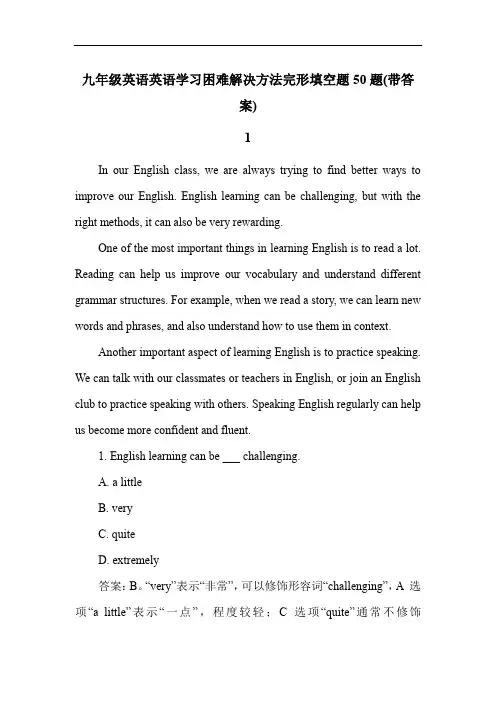
九年级英语英语学习困难解决方法完形填空题50题(带答案)1In our English class, we are always trying to find better ways to improve our English. English learning can be challenging, but with the right methods, it can also be very rewarding.One of the most important things in learning English is to read a lot. Reading can help us improve our vocabulary and understand different grammar structures. For example, when we read a story, we can learn new words and phrases, and also understand how to use them in context.Another important aspect of learning English is to practice speaking. We can talk with our classmates or teachers in English, or join an English club to practice speaking with others. Speaking English regularly can help us become more confident and fluent.1. English learning can be ___ challenging.A. a littleB. veryC. quiteD. extremely答案:B。
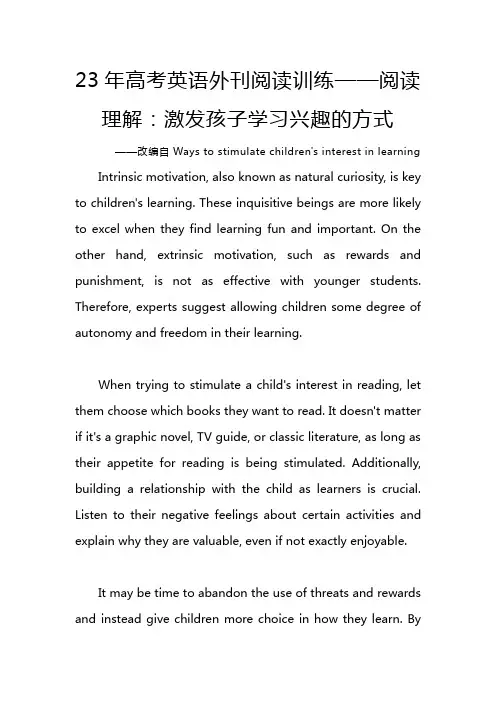
23年高考英语外刊阅读训练——阅读理解:激发孩子学习兴趣的方式——改编自Ways to stimulate children's interest in learning Intrinsic motivation, also known as natural curiosity, is key to children's learning. These inquisitive beings are more likely to excel when they find learning fun and important. On the other hand, extrinsic motivation, such as rewards and punishment, is not as effective with younger students. Therefore, experts suggest allowing children some degree of autonomy and freedom in their learning.When trying to stimulate a child's interest in reading, let them choose which books they want to read. It doesn't matter if it's a graphic novel, TV guide, or classic literature, as long as their appetite for reading is being stimulated. Additionally, building a relationship with the child as learners is crucial. Listen to their negative feelings about certain activities and explain why they are valuable, even if not exactly enjoyable.It may be time to abandon the use of threats and rewards and instead give children more choice in how they learn. Bystimulating their intrinsic motivation and allowing them to view their learning as their own free will, children can become more engaged in their education.【重点词汇】1. intrinsic [ɪnˈtrɪnsɪk] adj. 固有的,内在的2. motivation [ˌməʊtɪˈveɪʃən] n. 激励,动机3. natural [ˈnætʃrəl] adj. 自然的,天然的4. curiosity [ˌkjʊəriˈɒsəti] n. 好奇心5. inquisitive [ɪnˈkwɪzətɪv] adj. 好问的6. excel [ɪkˈsel] v. 超出,优于7. engage [ɪnˈgeɪdʒ] v. 吸引,参与8. extrinsic [ɛksˈtrɪnsɪk] adj. 外在的,非固有的9. reward [rɪˈwɔːd] n. 奖赏,报答10. punishment [ˈpʌnɪʃmənt] n. 惩罚,处罚11. effective [ɪˈfɛktɪv] adj. 有效的12. degree [dɪˈɡriː] n. 程度,学位13. autonomy [ɔːˈtɒnəmi] n. 自治,自主权14. freedom [ˈfriːdəm] n. 自由,自主15. stimulate [ˈstɪmjuleɪt] v. 刺激,促进16. interest ['ɪntrəst] n. 兴趣,爱好17. graphic [ˈɡræfɪk] adj. 图像的,图表的18. novel [ˈnɒvl] n. 小说,新奇的19. TV guide [tiː'vi: 'gaɪd] n. TV节目指南20. classic [ˈklæsɪk] adj. 经典的,古典的21. literature [ˈlɪtrətʃə(r)] n. 文学,著作22. appetite ['æpɪtaɪt] n. 食欲,胃口23. relationship [rɪˈleɪʃənʃɪp] n. 关系,联系24. crucial ['kru:ʃ(ə)l] adj. 至关重要的,关键性的25. negative ['neɡətɪv] adj. 消极的,否定的26. valuable ['væljʊəbl] adj. 宝贵的,有价值的27. enjoyable [ɪnˈdʒɔɪəbl] adj. 令人愉快的,可享受的28. abandon [əˈbændən] v. 放弃,遗弃29. view [vjuː] v. 看待,视为30. reigns [reɪnz] n. 统治,支配31. threats [θret] n. 威胁,恐吓32. give them a bit more choice [\gɪv ðem əbɪt mɔr tʃɔɪs] v. 更多选择权给他们33. older students [əʊldə'stju:dənts] 老年学生34. acknowledge [ək'nɒlɪdʒ] v. 承认,公认35. effectiveness [ɪf'ektɪvnɪs] n. 有效性,实用性36. explain [ɪks'pleɪn] v. 解释,说明37. exactly [ɪɡ'zæktli] adv. 精确的,恰好地38. expert ['ekspərt] n. 专家,能手39. met [met] v. 满足,达到40. stomach ['stʌmək] n. 胃,肚子41. digesting [daɪ'dʒestɪŋ] v. 消化,理解42. passion ['pæʃ(ə)n] n. 热情,激情43. valuable ['væljʊəbl] adj. 宝贵的,有价值的【阅读理解练习题】1. What is intrinsic motivation?A. Motivation through rewards and punishmentB. Natural curiosity that drives learningC. Allowing children to have freedom in their learningD. Building a relationship with the child as learners答案:B。
![英语拼读法教授教化的方法[教程]](https://uimg.taocdn.com/210f8f2e366baf1ffc4ffe4733687e21af45ff8b.webp)
英语拼读法教学是一种单词解码的阅读教学方法,也是一种有效的学习策略,教学内容上强调教授字形、发音之间的关系,重点教授字母或字母组合的发音规则及如何运用这些规则,教学对象以初学者为主,能帮助学生掌握单词拼读策略,有利于初级阅读学习。
我国传统字母教学只教授字母的名称音,学生学会了26个字母的名称音后,仍不能解码单词,因而不能自学英语。
而拼读法既教授字母的名称音,也教授字母及字母组合在单词中的发音,并且教授拼读策略,掌握了字母的发音和拼读策略后,学生可以自主解码单词。
English phonics teaching is a kind of word decoding reading teaching method, is also a kind of effective learning strategies, and emphasizes on teaching contents, a professor at the relationship between the font style, pronunciation, focus on teaching letters or letter combinations pronunciation rules and how to apply these rules, the teaching object is given priority to with a beginner, can help the students master the words spelling strategy, is advantageous to the primary reading. Our traditional teaching only letters letters the name of the professor, students learned the 26 letters of the name of the sound, still cannot decode words, so can't teach yourself English. Both professor and phonics letters, the name of the professor also letters and letter combinations in word pronunciation, spelling and professor strategy, grasp the pronunciation of the letters and spelling strategy, students can decode words independently.一、系统拼读法课程设计原则A curriculum design principles, system phonics(一)先易后难的设计原则(a) after the first difficult design principles先学字母名称音再学字母发音,先学辅音再学元音,先学短元音再学长元音。
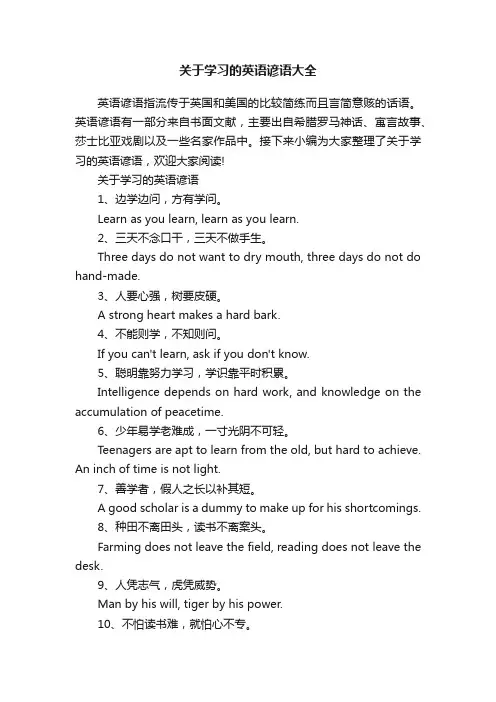
关于学习的英语谚语大全英语谚语指流传于英国和美国的比较简练而且言简意赅的话语。
英语谚语有一部分来自书面文献,主要出自希腊罗马神话、寓言故事、莎士比亚戏剧以及一些名家作品中。
接下来小编为大家整理了关于学习的英语谚语,欢迎大家阅读!关于学习的英语谚语1、边学边问,方有学问。
Learn as you learn, learn as you learn.2、三天不念口干,三天不做手生。
Three days do not want to dry mouth, three days do not do hand-made.3、人要心强,树要皮硬。
A strong heart makes a hard bark.4、不能则学,不知则问。
If you can't learn, ask if you don't know.5、聪明靠努力学习,学识靠平时积累。
Intelligence depends on hard work, and knowledge on the accumulation of peacetime.6、少年易学老难成,一寸光阴不可轻。
Teenagers are apt to learn from the old, but hard to achieve. An inch of time is not light.7、善学者,假人之长以补其短。
A good scholar is a dummy to make up for his shortcomings.8、种田不离田头,读书不离案头。
Farming does not leave the field, reading does not leave the desk.9、人凭志气,虎凭威势。
Man by his will, tiger by his power.10、不怕读书难,就怕心不专。
If you are not afraid of difficulties in reading, you are afraid of distraction.11、一分耕耘,一分收获。
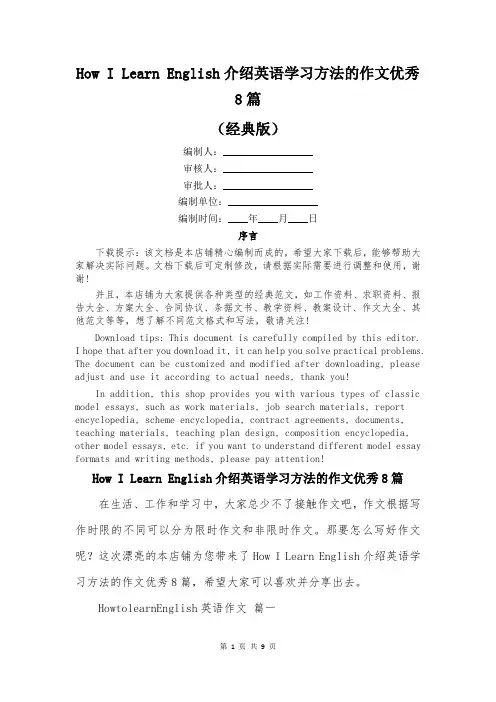
How I Learn English介绍英语学习方法的作文优秀8篇(经典版)编制人:__________________审核人:__________________审批人:__________________编制单位:__________________编制时间:____年____月____日序言下载提示:该文档是本店铺精心编制而成的,希望大家下载后,能够帮助大家解决实际问题。
文档下载后可定制修改,请根据实际需要进行调整和使用,谢谢!并且,本店铺为大家提供各种类型的经典范文,如工作资料、求职资料、报告大全、方案大全、合同协议、条据文书、教学资料、教案设计、作文大全、其他范文等等,想了解不同范文格式和写法,敬请关注!Download tips: This document is carefully compiled by this editor.I hope that after you download it, it can help you solve practical problems. The document can be customized and modified after downloading, please adjust and use it according to actual needs, thank you!In addition, this shop provides you with various types of classic model essays, such as work materials, job search materials, report encyclopedia, scheme encyclopedia, contract agreements, documents, teaching materials, teaching plan design, composition encyclopedia, other model essays, etc. if you want to understand different model essay formats and writing methods, please pay attention!How I Learn English介绍英语学习方法的作文优秀8篇在生活、工作和学习中,大家总少不了接触作文吧,作文根据写作时限的不同可以分为限时作文和非限时作文。
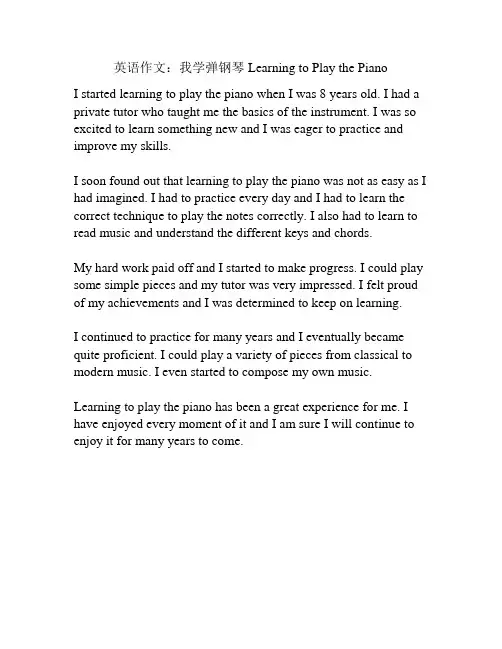
英语作文:我学弹钢琴 Learning to Play the PianoI started learning to play the piano when I was 8 years old. I had a private tutor who taught me the basics of the instrument. I was so excited to learn something new and I was eager to practice and improve my skills.I soon found out that learning to play the piano was not as easy as I had imagined. I had to practice every day and I had to learn the correct technique to play the notes correctly. I also had to learn to read music and understand the different keys and chords.My hard work paid off and I started to make progress. I could play some simple pieces and my tutor was very impressed. I felt proud of my achievements and I was determined to keep on learning.I continued to practice for many years and I eventually became quite proficient. I could play a variety of pieces from classical to modern music. I even started to compose my own music. Learning to play the piano has been a great experience for me. I have enjoyed every moment of it and I am sure I will continue to enjoy it for many years to come.。
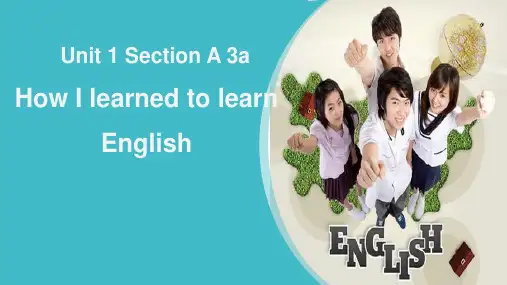
高中英语非谓语动词运用练习题50题1.She is considering ______ a new language.A.learningB.to learnC.learnedD.learn答案解析:A。
consider doing sth 是固定用法,表示“考虑做某事”。
B 选项to learn 通常用于want to do sth、hope to do sth 等结构中;C 选项learned 是过去式或过去分词,不符合语法要求;D 选项learn 是动词原形,也不符合语法要求。
2.______ too much time on video games is not good for students.A.SpendingB.To spendC.SpendD.Spent答案解析:A。
动名词短语作主语。
B 选项to spend 通常表示目的或将来的动作,此处不合适;C 选项spend 是动词原形,不能直接作主语;D 选项spent 是过去分词,不能作主语。
3.He loves ______ novels in his spare time.A.readingB.to readC.readD.reads答案解析:A。
love doing sth 表示“喜欢做某事”。
B 选项to read 通常表示一次性的动作,不如reading 符合语境;C 选项read 是动词原形,不能直接跟在loves 后面;D 选项reads 是第三人称单数形式,也不符合语法要求。
4.______ English well is important for our future.A.LearningB.To learnC.LearnD.Learned答案解析:A。
动名词短语作主语。
B 选项to learn 虽然也可作主语,但不如learning 常用;C 选项learn 是动词原形,不能作主语;D 选项learned 是过去分词,不能作主语。
高中英语非谓语动词运用练习题40题含答案解析1.She enjoys reading books. Reading books can broaden her knowledge.read booksreading booksto read booksreaded books答案解析:reading books。
动名词reading books 在这里作主语,表示一种习惯性的动作或一般的行为。
动词原形不能作主语,to read books 一般表示具体的某次动作,readed books 形式错误。
2.His hobby is playing basketball. He spends a lot of time on it.play basketballplaying basketballto play basketballplayed basketball答案解析:playing basketball。
动名词playing basketball 作表语,表示主语的爱好。
动词原形和过去分词不能作表语,to play basketball 一般表示目的或将来的动作。
3.They consider learning English important.learn Englishlearning Englishto learn Englishlearned English答案解析:learning English。
动名词learning English 作宾语,consider + 动名词/名词+形容词,表示认为……怎么样。
动词原形和过去分词不能直接作宾语,to learn English 一般表示目的或将来的动作。
4.She is fond of singing songs.sing songssinging songsto sing songssang songs答案解析:singing songs。
阅读的英文名言警句佳句赏析阅读的英文名言警句佳句赏析(篇1)Knowledge makes humble, ignorance makes proud.知识使人谦虚,无知使人骄傲。
Learning is the eye of the mind.学问是心灵的眼睛。
There is no end to learning.学无止境。
One is never too old to learn.活到老,学到老。
A good book is a good friend.好书如挚友。
Ignorance is not innocence but sin. -Robert Browning无知并非纯真,而是罪恶。
-罗伯特·布朗宁Knowledge comes, but wisdom lingers. -A.Tennyson知识来了,智慧却迟迟不前。
-丁尼生Learning does not stop as long as a man lives, unless his learning power atrophies because he does not use it. -Robert Hutchins人只要活着,学习就不改停下来,除非学习能力因不学而萎缩。
-罗伯特·胡钦斯Learning is like rowing upstream, not to advance is to drop back. -Chinese Proverb学如逆水行舟,不进则退。
-中国谚语Learning without thought is labor lost; thought without learning is perilous. -Confucius学而不思则盲,思而不学则怠。
-孔子Do not, for one repulse, give up the purpose that you resolved to effect. (William Shakespeare, British dramatist)不要只因一次失败,就放弃你原来决心想达到的目的。
Some people believe that reading is a critical part of learning and growth. Finding the right book at the right time can light an emotional spark within us that motivates us to read more, understand more, and read joyfully. When that happens, the world opens. Everything becomes possible. However, others believe we learn by doing, and learn best from first-hand and concrete experiences, using our senses, exploring our environment of people, things, places and events. What is your view on this issue? Write an essay in response to this question and give reasons to support your position. (题目提供:清华大学) 参考译文: 阅读造就你我读书往往对一个人的成长和学习有着重要的影响。
在恰当的时间,阅读一本好书可以点燃思想的火花,让我们更加博闻强识,享受阅读。
不知不觉,阅读拓宽了我们的视野,激发出无限可能。
然而,也有人认为,最好的学习方式是通过实践,使用我们的感官去探究周遭环境中的人、事和风景。
对此,你有何看法?就这一主题写一篇作文(本科及以上学生建议300字以上,其他学生如中学生建议100字以上),并给出合适的理由证明你的观点。
Learning to Read John Holt
close1RT In one of my classes were many children who had had great trouble with schoolwork, particularly reading. I decided to try at all costs to rid them of their fear and dislike of books, and to get them to read oftener and more adventurously (冒险地).
学会去读书
约翰·霍尔特 在我曾经任教的一个班上有许多孩子学习起来非常吃力,尤其是阅读。因此我决定不惜任何代价消除他们对书籍的恐惧和厌恶心理,让他们能够多读些书,更勇于尝试。close
2RT One day soon after school had started, I said to them, "Now I'm
going to say something about reading that you have probably never heard a teacher say before. I would like you to read a lot of books this year, but I want you to read them only for pleasure. I am not going to ask you questions to find out whether you understand the books or not. If you understand enough of a book to enjoy it and want to go on reading it, that's enough for me. Also I'm not going to ask you what words mean." 开学没多久,我对孩子们说:"我要跟你们说说读书的事,也许还没有哪个老师这样对你们讲过。今年我想要你们读许多书,你们只需要为寻求乐趣而读书,我不会去检查你们读懂了没有。如果你读了一点儿,觉得会喜欢这本书,并愿意把它读完,这就够了。我不会去考你们词语的意思。"close
3RT "Finally," I said, "I don't want you to feel that just because you
start a book, you have to finish it. Give an author thirty or forty pages or so to get his story going. Then if you don't like the characters and don't care what happens to them, close the book, put it away, and get another. I don't care whether the books are easy or hard, short or long, as long as you enjoy them. Furthermore, I'm putting all this in a letter to your parents, so they won't feel they have to quiz or check your reading at home." "最后,"我继续说道,"你们不要觉得读一本书就得把它读完。先读三四十页,看看故事情节如何发展。如果你不喜欢书中人物,或者对他们的经历不感兴趣,只管合上书,放到一边,去读另一本。你们读的书是难还是容易、篇幅长还是篇幅短,我都不在意,只要你们喜欢就行。另外,我会写信把我的意思告诉你们的家长,好让他们知道没有必要在家里查问或检查你们的读书情况。"close
4RT The children sat stunned (使震惊) and silent. Was this a teacher
talking? One girl, who had just come to us from a school where she had had a very hard time, and who proved to be one of the most interesting, lively, and intelligent children I have ever known, looked at me steadily for a long time after I had finished. Then, still looking at me, she said slowly and solemnly, "Mr. Holt, do you really mean that?" I said just as solemnly, "I mean every word of it." 孩子们都愣住了,坐着不出声。这真的是老师在说话吗?其中一个女孩,因为功课不好最近才转学到我们学校来,后来我发现她非常有趣、活泼、聪明,在我所有的学生中都算突出的。我讲完后,她盯住我看了很久。然后,她继续看着我,缓慢而严肃地问:"霍尔特先生,你说的话是真的吗?"我也同样严肃地回答:"真的,一点不假。"close
5RT Apparently she decided to believe me. The first book she read
was Dr. Seuss's How the Grinch Stole Christmas, not a hard book even for most third graders. For a while she read a number of books on this level. Perhaps she was clearing up some confusion about reading that her teachers, in their hurry to get her up to "grade level," had never given her enough time to clear up. After she had been in the class six weeks or so and we had become good friends, I very tentatively (试探性地) suggested that, since she was a skillful rider and loved horses, she might like to read National Velvet. I made my sell as soft as possible, saying only that it was about a girl who loved and rode horses, and that if she didn't like it, she could put it back. She tried it, and though she must have found it quite a bit harder than what she had been reading, finished it and liked it very much. 显然,她打算照我说的办。她读的第一本书是索伊斯博士写的《格林奇偷走圣诞节》,这本书对大多数三年级的学生都不算难,更不要说这个年级的孩子了。有一阵子,她读的书都在这个难易度上。也许她是在消除对阅读的一些困惑,而以前她没时间去做,因为老师总是催促她看这个年级"该看的书"。她在这个班上学习了六七个星期后,我们成了好朋友。我试探地向她建议:既然她喜欢马,而且骑马的水平还不错,她可以读一读《侠女神驹》。我尽可能委婉地提出这个建议。我只告诉她那是一本关于一个热爱马并常常骑马的女孩的故事;如果她不喜欢读,她可以放回书架。她去读了,也许她觉得这本书比她先前读的书要难点,但是她读完了,而且挺喜欢。close
6RT During the spring semester, she really astonished me, however.
One day, in one of our many free periods, she was reading at her desk. From a glimpse of the illustrations I thought I knew what the book was. I said to myself, "It can't be," and went to take a closer look. Sure enough, she was reading Moby Dick, in the edition with woodcuts (木刻) by Rockwell Kent. When I came close to her desk, she looked up. I said, "Are you really reading that?" She said she was. I said, "Do you like it?" She said, "Oh, yes, it's neat!" I said, "Don't you find parts of it rather heavy going?" She answered, "Oh, sure, but I just skip (略过,跳过) over those parts and go on to the next good part." 春季的那一学期,她的表现可真的让我吃惊了。一天,在我们的自习课上我看到她坐在课桌前看书。我瞥了一眼书中的插图我就知道这是一本什么书了。但是我不相信我的眼睛:"不可能吧。"我走过去仔细一看,果然她在读《白鲸》,那版本配有罗克威尔·肯特的木刻画。我走近她的时候,她抬起头来。我问她:"你真的在看这本书吗?"她说,是的。我又问:"你喜欢这本书吗?""嗯,是的。这本书很好。"她答道。"你不觉得有些地方很难吗?"我又问道。"有啊,不过,看不懂就跳过去,挑有意思的地方看。"她这样回答。close